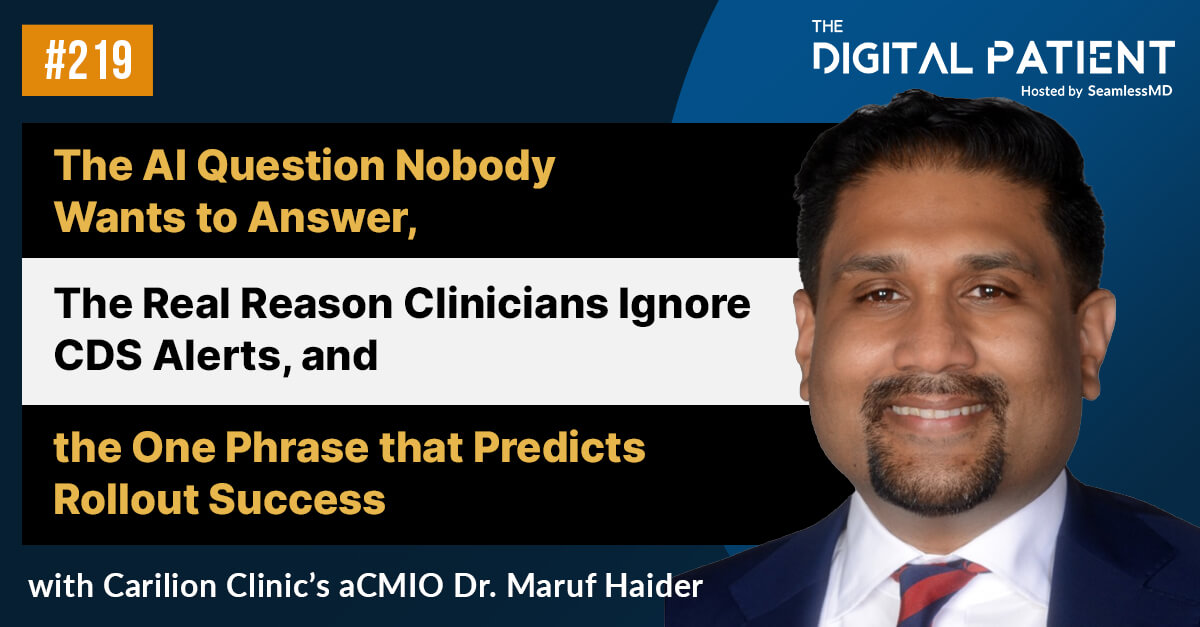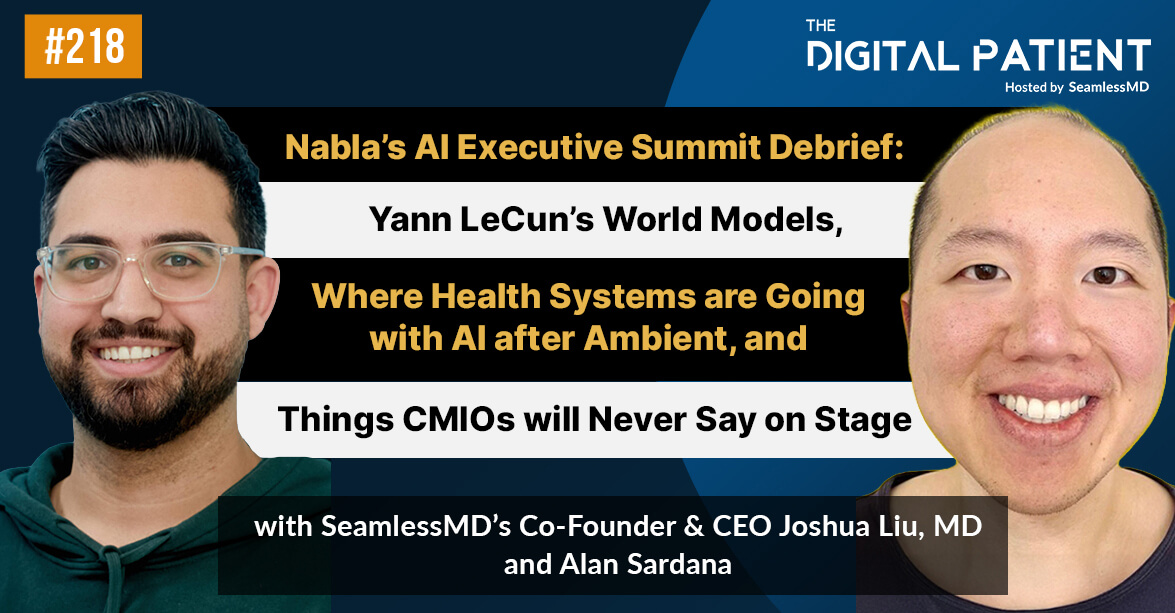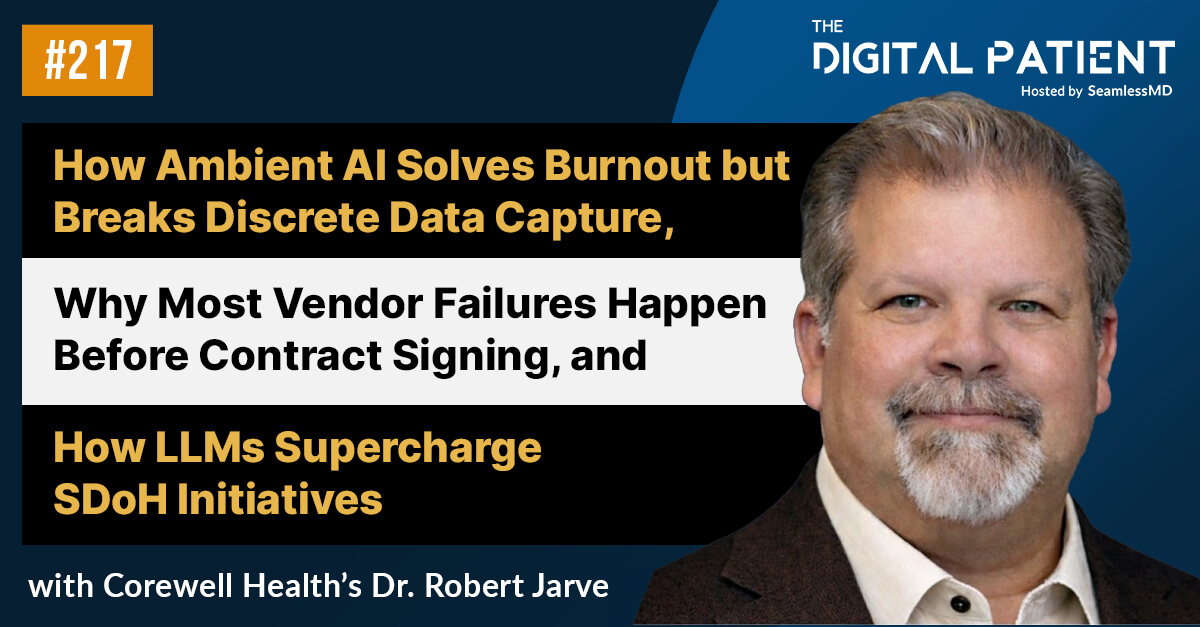Subscribe on: RSS | SPOTIFY | APPLE PODCAST | GOOGLE | BREAKER | ANCHOR
Audio:
Video:
In this episode of the SeamlessMD Podcast, Dr. Joshua Liu, Co-founder & CEO at SeamlessMD, and marketing colleague, Alan Sardana, chat with Dr. Eric Wallace, Medical Director of Telehealth at UAB, about "Leveraging Digital Care & Telemedicine for Rural Patients and Addressing Health Disparities Impacted by Technology".
See the full show notes below for details.
Guest(s):
Dr. Eric Wallace (@EricWallaceuab1), Medical Director of Telehealth at UAB
Dr. Joshua Liu (@joshuapliu), Co-founder & CEO at SeamlessMD
Episode 65 – Show notes:
[0:00] Introducing Dr. Eric Wallace, Medical Director of Telehealth at UAB;
[2:45] How Dr. Wallace grew up rounding with his father in hospitals and eventually ran his lab at 18, and why being exposed to medicine at an early age established a solid foundation for what it means to be a physician, especially one who prioritizes forming meaningful relationships with patients;
[4:00] Why Dr. Wallace received his bachelor's degree in Spanish so he could communicate with his extended family in Chile and to pursue a career with doctors without borders;
[7:33] How Dr. Wallace discovered his passion for nephrology while learning about infectious disease and recognizing that the renal modules were his favorite despite his peers shying away from the subject, and how nephrology patients are often lifelong patients with whom relationship-building is essential;
[11:00] Why Dr. Wallace embarked on his Telehealth journey after working with home dialysis patients who would frequently travel three hours one-way for a 15 minute visit and would request telehealth;
[16:15] How Dr. Wallace fought an uphill battle for two years before seeing his first telehealth patient as regulations needed to be set for the technology as well as operations & logistics, billing, and IT support, but why Dr. Wallace persisted on behalf of his patients;
[23:18] How Dr. Wallace’s Telehealth work with home dialysis patients paved the way for UAB’s myriad other telehealth offerings such as their teleICU, remote patient monitoring and digital patient engagement;
[24:39] Why Dr. Wallace does not consider any technology unless three questions are answered:
1) Who is going to use the technology (which patients)?
2) Is the technology easy to use?
3) Have the operations been configured (what are we doing with the data)?
[28:44] How Dr. Wallace addresses health disparities impacted by technology by first defining what is a disparity (as it relates to technology) such as older patient populations not using video, assigning a telehealth disparity score, and leveraging telehealth educators for patients with a certain score;
[36:45] Why Dr. Wallace believes there is a line between public health and healthcare that matters especially in a value-based healthcare environment to educate and prevent disease earlier;
[39:15] Why changing the COVID-19 guidelines so many times led to public mistrust and how health systems implementing technology moving forward will need to ensure the innovation fosters trust by keeping things simple;
[44:44] Why Dr. Wallace created Project ECHO as a way to disseminate knowledge between providers – like a surgery amphitheater for every provider – and how a COVID-19 ECHO was leveraged during the pandemic to support provider collaboration in nursing homes;
Fast 5 / Lightning Round:
- What is your favorite book or book you’ve gifted the most?
“The Lord of the Rings” series by J. R. R. Tolkien
- How has an apparent failure set you up for greater success?
“Almost all of our telehealth programs begin with a series of failures… I even gave a talk recently, the alternate title of the talk was: 10,000 ways NOT to do remote patient monitoring!” - Would you rather have Super strength, super speed, or the ability to read people’s minds?
“I’d rather have the ability to change people’s minds… So mind reading.”
- What is something in healthcare you believe that others might find insane?
“Cost.”
- COVID-19 lockdown related – what is 1 hobby or activity you’ve gotten into since the pandemic?
“I got into flying (planes) and cycling (back on the ground).”
.svg)










.png)
